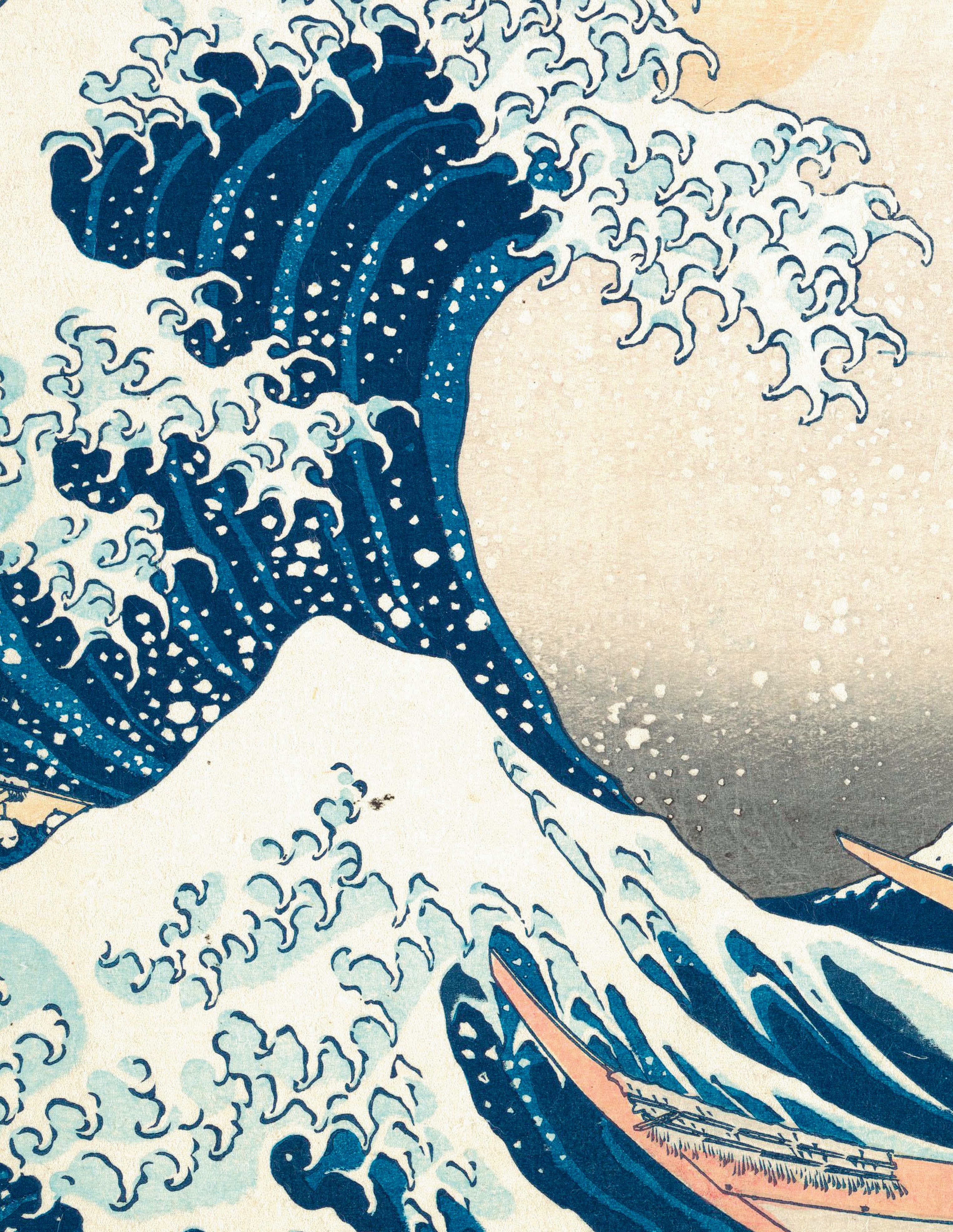




Dear Reader,
How exciting that you are at this very moment holding (or on the verge of holding) Tomorrow, and Tomorrow, and Tomorrow in your hands! I am the author of this book and I hope you’ll love it. The cover’s a bit mesmerizing, right? Hokusai’s The Great Wave features prominently in the story – my main characters, who are video game designers, draw inspiration from it when they are making their first game.
Tomorrow, and Tomorrow, and Tomorrow is about love, art, video games, and time. It’s the story of Sadie Green and Sam Masur, who have a three-decade long friendship and artistic collaboration. Sadie Green and Sam Masur meet as children in a hospital game room, and when they become adults, they decide to make games together. They have a romance of the mind, if not the body. Sam, for a variety of reasons —a childhood injury, but I don’t want to reduce it to this trauma; it may just be his essential self—is not particularly interested in sex or even in being in his body. Despite this, he is a very romantic person, and he loves Sadie Green more than anyone else in his life. Sam feels that the highest expression of himself and his love are the games he makes with Sadie. And maybe this is true for Sadie, as well, but Sadie is a physical person, and she needs more than what Sam can give. Tomorrow, and Tomorrow, and Tomorrow is a friendship story and, to an extent, a marriage story, but it’s also an impossible puzzle for Sadie and Samfor which there is no obvious solution. What if the most important person in your life is not your spouse or your child or any of the usual suspects? What if it truly is your colleague and your friend?
Tomorrow, and Tomorrow, and Tomorrow is the story of two brilliant people, who are fantastic at making art and somewhat less fantastic at being humans. It’s about how rewarding and tender and volatile creative collaboration can be, and what it feels like to truly share one’s work with someone. It’s about how difficult it is to connect even though we have ever increasing means to do so, and the possibility of making meaningful connections in virtual spaces. It’s about why it’s worth it to continue loving people and making things in an imperfect and uncertain universe. And yes, it’s about video games. My parents both worked in computers, and I had played video games my whole life without thinking that much about what they mean. As a writer, I know I’m onto a great subject when it contains and reflects the whole world. That said, I don’t think it particularly matters if you play video games: video games are just another form of storytelling, by which I mean another way that people mark time and make sense of their lives.
Thank you again for reading and no matter what games you play—Monopoly, poker, crossword puzzles, or Tetris—I hope you’ll love Tomorrow, and Tomorrow, and Tomorrow!
Yours,
Gabrielle Zevin
Letter from
Author //
A
the
A Q &A with Gabrielle Zevin

What was your first experience with video games?
When I was around three, I remember going on vacation to visit my grandmother in Hawaii and seeing video game cabinets at the hotels: Ms. Pac Man, Donkey Kong, and the like. I was attracted to them without knowing why. Probably, the first video game I ever played was Ms. Pac Man, which is the first video game Sam plays in the book, too.
As you sat down to write this book, who came first: Sam Masur or Sadie Green?
In most meaningful ways, they were born at the same time. I can’t imagine one existing without the other. But technically speaking, I believe Sam had a name before Sadie had a name.
How would you describe Sam and Sadie’s personal relationship? Their working relationship?
Sam and Sadie are closer to each other than anyone else in their lives, and yet they are not lovers, not married people, sometimes not even friends. At one point in the novel, Sadie is proposed to by someone, and she says she doesn’t believe in marriage. The truth is she cannot be married to anyone else, because in a sense she is married to Sam. They are work spouses, but what’s a work spouse when your work is your whole life?
Their working relationship? Sadie is more ambitious and restless creatively. Sam is more interested in connecting with an audience and connecting in general. I think they feed off each other and push each other and give each other certain qualities that the other lacks. Their creative partnership is fraught, but I think they are better together than they would be apart.
Were there any real-life video games you drew inspiration from while writing about the ones developed by your characters in the book (EmilyBlaster, Ichigo, Pioneers, Mapletown)?
A ton, and I’m warning you that this list will not comprehensive! EmilyBlaster is inspired by Math Blaster! a math game I played as a kid in the 80s. It needed to be the kind of thing 90s era Sadie could invent for her seminar the night before it was due. Ichigo is inspired by early Nintendo games, like Mario or Zelda, and the PC game, Commander Keen.
Pioneers is, of course, Oregon Trail, but also, Stardew Valley and a series of games set in the old west called Westward. I wanted the narrative of Pioneers to feel like a muddy dress movie, like Portrait of a Lady on Fire. Our Infinite Days is closest to The Last of Us but was additionally inspired by books like The Road and Station Eleven. Mapleworld is significantly The Sims, Harvest Moon, EverQuest, and Animal Crossing. Dov’s game, Dead Sea, is a combination of BioShock, Left 4 Dead, and Resident Evil.
Can you discuss the inspiration for the title?
The title of Tomorrow, and Tomorrow, and Tomorrow derives from Macbeth’s famous Act V soliloquy. It is one of the bleakest speeches in all of Shakespeare, but Marx, the character who invokes it in my book finds great hope in it—the idea that we might start again every day of our lives—and a metaphor for playing video games with their infinite restarts, extra lives, and chances for redemption.
A lot of this book is about work and the creative process. Can you talk about your own creative process?
Someone asked me this question recently, and I felt stumped. I think it’s because I’ve had a different process on every book. And to an extent, I accept that I have no process. For me, part of writing the book comes down to finding the process to write the book.
But to speak in generalities: The beginning is the hardest part for me; I think it’s because it is difficult to write people you don’t yet know. I like to imagine the ending of the book early on, but I never know the actual ending until I get to it. I work early and I like to be well rested. I read over all the work I have done every day before I start (until the point at which the book becomes too long for me to do that.) I try to be as open as I can and I try to fully give myself over to the project of the novel, come what may. I live in the world, and I try to make sense of and respond to the things I see in the world through art.
We live during a time when there seem to be endless ways to connect online: Zoom, FaceTime, Google Meet, Twitch, TikTok, Twitter, Clubhouse, Instagram, and all of the other— seemingly infinite—virtual spaces. To what extent do you miss the early days of the internet?
I miss the fact that we had no idea what all of this was going to become. I miss the sense of possibility. At first, it seemed innocent—Wow, I can make friends from some other town? That’s cool! In high school, I remember driving to a town fifty miles to the north, with my friend, to meet some guy she was exchanging messages with on a Prodigy board (Google it!)—and you know, he was exactly who he said he was. It hadn’t yet occurred to anyone to pretend to be someone different!
And this isn’t your question, but I often remind myself that all the social media platforms are still young (some of them, like Prodigy, won’t survive), and we are still young in terms of our relationship with them. It is tempting to be nostalgic and nihilistic, but I try not to give myself over to those emotions. We cannot always predict what will be from what has been. (Even if that’s the point of most online algorithms!)
So, I’m quite hopeful. At some point in my book, Sam says that “It is not an inevitability that we should be the worst versions of ourselves behind the mask of an avatar.” And I agree. But I think we have to acknowledge that our goals as humans and the platform’s goals are often not aligned. Because of this, the ethical demands on people using social media platforms are greater than they first appear.
And here’s where I mention that I use almost no social media. I’ll choose a platform for the three months before and after I have a book coming out, and that’s it. I find I can’t write well when I’m online too much.
What are you working on next?
I’m currently writing the screenplay for the movie version of Tomorrow. And after that, I have a novel I want to write—it’s an idea I’ve been turning over for a long time. I had a breakthrough for it last winter: I was inventing fake titles of books for an author character in another project. I looked at one of the fake titles I’d written down, and I thought, what is this book about? And then I imagined it.
Questions and Topics for Discussion
The questions, discussion topics, and other material that follow are intended to enhance your group’s conversation about Gabrielle Zevin’s Tomorrow, and Tomorrow, and Tomorrow, a novel steeped in nostalgia and innovation that follows three friends as they come of age in the world of video games, creating stories and worlds that enhance, redefine, and preserve their rich bonds while attempting to defy the limits of mortality.
1. Describe the types of “love” shared among Sadie, Sam, and Marx. What catalyzes the shifts in their relationships over the years? Consider Sadie’s explanation to Sam about why they never got together: “Lovers are . . . common. Because I loved working with you better than I liked the idea of making love to you. Because true collaborators in this life are rare” (page 393).
2. How does Dov set the standards for Sadie’s work as a game designer, as a woman, and as a wife/ partner to both Sam and Marx? What compels her to keep him in her life even after they break up?
3. Sadie considers how their experience as designers would have been different if they were born a decade (more or less) before or after when they were born. Technological advances aside, what else would have been different about their story if it was shifted slightly in time? Consider Sadie and Dov’s relationship, the options for Sam’s foot, the proliferation of mass shootings, and other cultural and social events.
4. Marx’s main creative role is as an actor, which is limited to his time in college. How does he continue to contribute to the creative process with Sam and Sadie—as producer, muse, organizer, and more? What does his participation suggest about the various ways in which one participates in art beyond being an artist?
5. If you were in their shoes, would you have taken the deal with Cellar Door Games or Opus Interactive to produce Ichigo? How would the novel have turned out differently if they had chosen Cellar Door?
6. How does Sam’s foot—while it’s injured and after it’s been amputated—shape his sense of self? Consider his reflections on gender, sexuality, and pain, including how he constructs his avatar as Mayor Mazer. How do the sensitivities of his relationship with this part of his body improve and damage his relationships with the people he loves?
7. The novel bends its narrative form to assume the structure of the games in various places— namely, Both Sides, the NPC, and Pioneers sections. How did your reading experience shift in those sections? Did the format enhance your immersion into the worlds the team was building, even through text alone?
8. Sam suffers numerous losses in the book—his mother, Anna; his friend and partner, Marx; his foot; his relationship with Sadie; his grandfather. How does gaming help him cope with his thoughts about his mother: “There are, he determines, infinite ways his mother doesn’t die that night and only one way she does” (page 172)?
9. Whom do you think deserves more creative credit for Ichigo and Mapleworld, their two most successful ventures—Sam or Sadie? How does the media’s interpretation of Sam as Ichigo and Mayor Mazer affect their working dynamic?
10. Do you think Sadie and Sam regret the choices they made for Mapleworld, given how the game’s political voice led to Marx’s death? Do you think Marx had any regrets?
11. What alternative “plays” during the shooting at Unfair Games could have caused Marx to live?
12. Marx muses while in his coma: “Memory, you realized long ago, is a game that a healthy-brained person can play all the time, and the game of memory is won or lost on one criterion: Do you leave the formation of memories to happenstance, or do you decide to remember?” (page 286). What do the characters in the novel decide to remember through their games? Do they acknowledge the role and value of happenstance in the creation of their real world and their imagined worlds?
13. From the title of the novel, to Sadie’s invocation of Emily Dickinson, to Marx’s epithet, “Tamer of Horses,” to Master of the Revels, there are many allusions to classical literature woven throughout the novel. What does this suggest about the nature of storytelling—how many ways can the same stories, emotions, and experiences be reinvented? Does the team believe they can create and are creating something new in their work, or are they finding new ways of expressing universal themes? What do video games offer a person in the form of entertainment, community, and growth that a play, a poem, or other art forms do not?
14. Discuss how the other game designers that join Unfair Games—Ant and Simon, and the Worths— contribute to the plot of the novel. What would they be if the novel was a video game?
15. What does taking over Dov’s class at MIT help Sadie understand about her life path, including the motives and conditions that helped her make Ichigo, as prompted by her conversation with Destiny?
16. Sadie notes that the kids in her class have a very different attitude toward telling their stories, in life and in games, compared to when she was growing up in the 1980s. How have you observed similar shifts within your own families and communities? How has technology shaped our modes of expression, sense of self-worth, and value systems, especially among teenagers?
17. What video games have you formed an attachment to in your life, as a child and/or as an adult? What about the gameplay, story, or characters drew you in and left an impression on you?
18. Both Sadie and Sam use games to explicitly memorialize their loved ones and process their losses. If you could design a game to change or preserve some part of your reality, what would it be like?
Recommended Reading
Cloud Cuckoo Land
The Interestings
The Animators
Then We Came to the End Fates and Furies
The Amazing Adventures of Kavalier & Clay
Interior Chinatown Stories of Your Life and Others
Trust Exercise
The Memory Police
The Nix
No One Is Talking About This Sea of Tranquility
The Starless Sea
The Overstory
// BY ANTHONY DOERR
// BY MEG WOLITZER
// BY KAYLA RAE WHITAKER
// BY JOSHUA FERRIS
// BY LAUREN GROFF
// BY MICHAEL CHABON
// BY CHARLES YU
// BY TED CHIANG
// BY SUSAN CHOI
// BY YOKO OGAWA
// BY NATHAN HILL
// BY PATRICIA LOCKWOOD
// BY EMILY ST. JOHN MANDEL
// BY ERIN MORGENSTERN
// BY RICHARD POWERS
ANIMAL CROSSING
BIOSHOCK EVERQUEST
HARVEST MOON
Play the video games that inspired Tomorrow, and Tomorrow, and Tomorrow
THE LAST OF US LEFT 4 DEAD MARIO MATH BLASTER!
RESIDENT EVIL THE SIMS
ZELDA
Recommended playing listen along on spotify!
The Book of Love
BY THE MAGNETIC FIELDS

Neighborhood #1 (Tunnels)
BY ARCADE FIRE
Thirteen
BY BIG STAR
I Won’t Hurt You BY THE WEST COAST POP ART EXPERIMENTAL BAND
Because BY THE BEATLES
When I Paint My Masterpiece
BY BOB
DYLAN
+ more!







